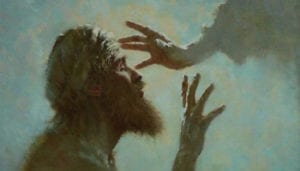
Reflection on two Gospel passages on the healing of the man born blind. (John 9:1-41)
- His disciples asked him, “Rabbi, who sinned, this man or his parents, that he was born blind?” Jesus answered, “Neither he nor his parents sinned; it is so that the works of God might be made visible through him. We have to do the works of the one who sent me while it is day. Night is coming when no one can work. While I am in the world, I am the light of the world.” (John 9:1-5)
Why did the disciples ask Jesus that question? The concept that children suffer the sins of their fathers comes from the Pentateuch, specifically from the Book of Exodus:
Then God spoke all these words: I am the LORD your God, who brought you out of the land of Egypt, out of the house of slavery. You shall not have other gods beside me. You shall not make for yourself an idol or a likeness of anything in the heavens above or on the earth below or in the waters beneath the earth; you shall not bow down before them or serve them. For I, the LORD, your God, am a jealous God, inflicting punishment for their ancestors’ wickedness on the children of those who hate me, down to the third and fourth generation. (Exodus 20:1-5)
Note also that this concept is repeated in Exodus 34:6-7 and Numbers 14:18.
But Jesus tells His disciples that neither the man born blind nor his parents sinned; rather, the reason that the man was born blind was so that the works of God might be made visible through him. From a man-centered point of view, it would seem cruel of God to make a man born blind just so that Jesus can perform a miracle when he becomes an adult. What about the many years of blindness which the man had to endure? On the other hand, from a God-centered point of view, Jesus did not merely restore the sight of the blind man; Jesus saved the blind man through faith. Now, isn’t the blind man’s eternal salvation infinitely better than for him not to be blind? In the Gospel of Matthew, Jesus tells His disciples: “And if your eye causes you to sin, tear it out and throw it away. It is better for you to enter into life with one eye than with two eyes to be thrown into fiery Gehenna.” (Matthew 18:9) And to the crowds, Jesus said: “If your right eye causes you to sin, tear it out and throw it away. It is better for you to lose one of your members than to have your whole body thrown into Gehenna.” (Matthew 5:29)
In verses 4-5, Jesus hints at His Passion and Death. The “night” time refers to Christ’s Passion and Death; therefore, Jesus aims to do the works of the Father before that time comes. Jesus also mentions that while He is in the world, He is the Light of the world. We must be careful not to interpret this statement as saying that Jesus is no longer the Light of the world after His Ascension into heaven. Jesus remains and is always the Light of the world, just as He told the Pharisees: “I am the light of the world. Whoever follows me will not walk in darkness, but will have the light of life.” (John 8:12) The proper context of understanding verses 4-5 would be that Jesus does the will of the Father. Doing things according to the will of God enables us to do things at the right time, at the right place and in the right way. Even at times when it doesn’t seem to be that way, God’s way is always the best way, for God knows and sees everything, and God always does what is best for us. James the Apostle tells us: “All good giving and every perfect gift is from above, coming down from the Father of lights, with whom there is no alteration or shadow caused by change.” (James 1:17)
- Jesus said, “I came into this world for judgment, so that those who do not see might see, and those who do see might become blind.” Some of the Pharisees who were with him heard this and said to him, “Surely we are not also blind, are we?” Jesus said to them, “If you were blind, you would have no sin; but now you are saying, ‘We see,’ so your sin remains.” (John 9:39-41)
This Gospel passage speaks of spiritual, rather than physical blindness. The one who regards himself as being able to see (or living in the light) does not recognize his sins; while the one who regards himself as blind (or living in darkness) recognize his sins. Therefore, Jesus came into this world to pass this judgment: So that those who regard themselves as without sin do not recognize their sinfulness, while those who regard themselves as sinners recognize their sinfulness. Ultimately, those who recognize their sinfulness are open to receive the Light, who is Jesus Christ, and to believe in Him; while those who regard themselves as without sin remain in their sinfulness, because they are not open to believe in Jesus Christ.